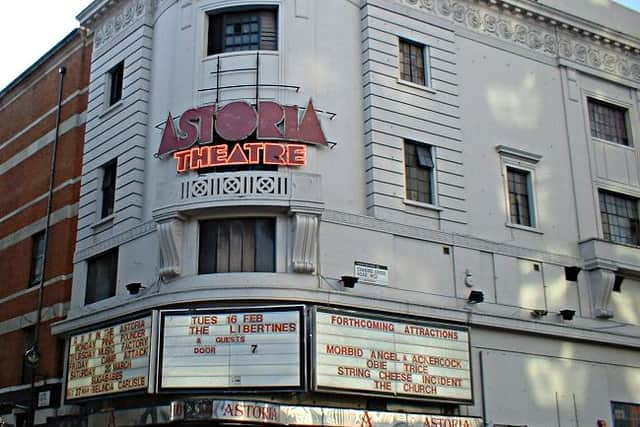Cro Cro Land 2024: music festival highlights the problem of dwindling smaller music venues in the UK
This article contains affiliate links. We may earn a small commission on items purchased through this article, but that does not affect our editorial judgement.
and live on Freeview channel 276
It’s a tale that stretches long before the lockdowns of COVID-19; the great mystery of the disappearing concert venue. From overheads becoming too costly for grassroots venues to even the mighty Night and Day being subjected to what some might call unfair noise control complaints.
“There certainly was a lack of venues already” says Cro Cro Land Festival co-founder and Bugeye frontman Angela Martin, going as far as to say it’s been a long-standing problem she has faced, not only as a promoter but also as a music fan herself. “We’ve certainly seen the speed in which venues have been disappearing increase since COVID. As for Croydon. Up until the 90s, it was very much a place that was on most band’s tour schedules, but those venues that housed those bands are long gone now.
Advertisement
Hide AdAdvertisement
Hide Ad“Places like the Greyhound, The Black Sheep and The Cartoon, where the likes of The Cure, Sex Pistols and David Bowie played and local bands could cut their crust are no more. This was one of the reasons that we created Cro Cro Land. To bring bands back to one of the birthplaces of punk.”
Cro Cro Land Festival was born in 2019 as a rebuke to the continued issues surrounding smaller acts and the opportunities to play in venues decreasing more each year it would seem. “We took over an old hotel earmarked for demolition, built 3 stages and held a massive party come festival where bands and fans all hung out together, Angela explains regarding the birth of the festival. “Bands on the bill included Nova Twins, Blood Red Shoes, She Drew The Gun, ARXX, The Lovely Eggs, Berries, Bugeye and so many more.”


“I sort of felt sad that so many young people would miss having the chance to play those types of venues,” Angela continues, reeling off names such as The Bull and Gate in Kentish Town and London’s Astoria. Explaining her connection to the smaller concert venue, she goes on to state “I mean, if it hadn’t been for those spaces I mentioned, I doubt I would have been in a band, but then I also thought about how political the landscape is in music. Festival slots go to artists with labels and management and you only get those if you’ve been able to build a following.”
But what has led to the problems with concert venues closing; are venue owners in a situation where the development of new accommodation for people in what should be considered a noisy environment is leading to what some feel are unfair noise control complaints - akin to the Night and Day situation?
Advertisement
Hide AdAdvertisement
Hide Ad“Quite frankly I find this sort of example ridiculous; people who buy an apartment in a city are going to experience noise. People who move near a music venue are going to experience noise. This sort of complaint is laughable.”
Pausing for a moment, Angela then tries to reconcile with the plight of the new homeowner: “Perhaps apartments for sale need to detail out potential noise issues in a certain radius that currently exist so it’s transparent what people should expect. That way the person renting or buying the property therefore agrees and understands these issues before going ahead with signing a rental or purchase agreement.”
“Unless those venues were not there when they moved in. That’s a completely different issue.” When asked if perhaps COVID-19 exacerbated the smaller concert venue situation than perhaps housing projects in and around London, Angela’s response was more even-handed for property developers: “I think it’s a mixture of both. Most venues are not treated the same as centres of arts, they are seen as pure hospitality businesses and quite frankly you can make more money doing something else, so landlords sell their leases to developers and pubs become the next hot ticket on the gastro pub scene.”


Despite arts and culture being a big selling point for several UK cities, Angela thinks there needs to be a serious rethink on how something viewed by some as a “commodity” needs to be fiscally viable in the long run. “Spaces supported by certain entities in the music industry as well as more accessible grants is a first step.”
Advertisement
Hide AdAdvertisement
Hide AdThe smaller music venue is considered a big part of the industry's delicate ecosystem, and for some performing at their local pub or venue is akin to taking to the stage at Wembley Stadium. “For most bands, these venues will be the biggest stage they ever play and that’s perfectly fine and actually pretty wonderful. I think a lot of people do not understand how hard but also rewarding it is to get up on a stage and perform. Small venues are overlooked as places that truly do impact personal development in a positive way” Angela explains regarding its place as a means of cutting teeth within the music scene.
“You have to have guts, drive and build your confidence to do this. These are all great life skills. The mistake that most people make is that these venues are all about growing future headliners. It’s more than that. They are places to create and celebrate music. It doesn’t matter if the bands go on to be heavy hitters, it’s the rewarding experience and freedom to create that we are destroying with venue closures. "
“Everyone has to start somewhere in music, and some of us will headline festivals, while others will head in other directions, but without these spaces, you remove the opportunity to explore what is possible.”
When is Cro Cro Land Festival 2024 and how to get tickets?
Cro Cro Land Festival 2024 takes place on the 13 and 14 of April 2024 at Stanley Arts Centre, London. Tickets are still available through WeGotTickets, priced between £22 for day tickets and £33 for weekend tickets.
Comment Guidelines
National World encourages reader discussion on our stories. User feedback, insights and back-and-forth exchanges add a rich layer of context to reporting. Please review our Community Guidelines before commenting.
